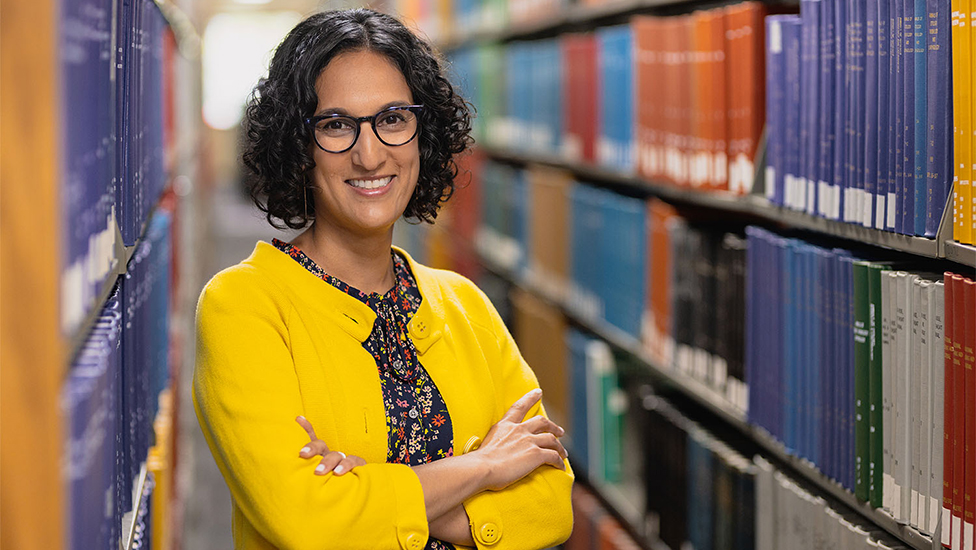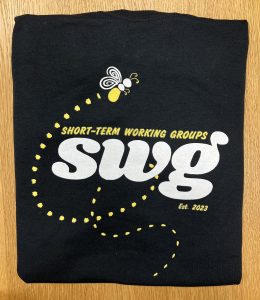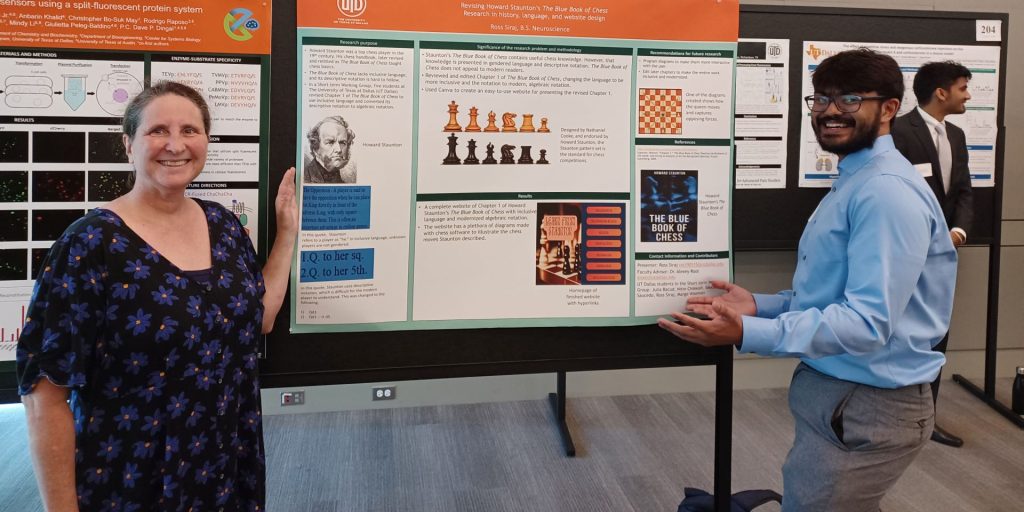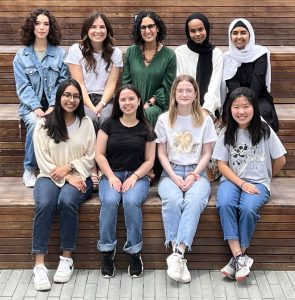
Second of a four-part series
By Rick Vacek | February 29, 2024
The question was about the beginnings of an exciting new program for University of Texas at Dallas students.
The answer was about how a tall task evolved into the Short-term Working Groups (SWGs, pronounced swigs).

“So, picture this,” Dr. Salena Brody said, giving her listener the indelible impression that this picture would be worth far more than a thousand words.
It was January 2020, and the Center for Children and Families was putting together a series of talks. One of them was to be about prejudice, the area of Brody’s expertise in her role as psychology professor in the School of Behavioral and Brain Sciences.
One problem: The focus was supposed to be on children, which is not her area of expertise. She has centered her work on adults. Eager for research help, she reached out to her students online and couldn’t believe what happened next.
“They already do so much work, I thought nobody was going to want to do this,” she said. “Then 12 of the 30-something students wrote back and said, ‘Yes, I would love to do this.’ That was super eye-opening for me because I thought, ‘These students are already doing 10-plus hours of homework a week and just signed up to do more. Why?’”
She heard more about their motivation in their small gatherings.
“They wanted to do it for a couple of reasons: They were interested in the topic, but I think the bigger thing I realized was that they wanted that professional relationship with me. That’s something I would not have thought about before, that there’s value in them having someone know them. I had been thinking about it from, ‘I’ve got this thing to do. It’s overwhelming. I could use some help.’”
It would be the type of experience normally associated with graduate school. “I really, really am trusting you to bring your best because this isn’t for play,” she told them. It was the thought process in how to reverse engineer a talk – an education she never experienced as an undergraduate.
“I wanted to show them how the sausage was made,” she said.

The recipe was simple: Students were assigned different topic areas mapped to the narrative arc of the presentation. It was essential that each topic area presented clear evidence, so Brody grilled each student to ensure the group had a solid understanding of what scholars in the field know in that area.
“You’re on the spot. Tell me what you found, and you’re the only one who found that thing. You’re the expert on it,” she would say. “I am 100% relying on your expertise as a student to have made sense of this, to pitch why it would be useful, which parts. And then, since I haven’t read it yet, I’m going to start asking you questions, not to grill you, but because I actually need to know that.”
“They recognized that they were equal partners in this arrangement, and you could see the confidence building. … The sessions were amazing.”
DR. SALENA BRODY
The result:
“They recognized that they were equal partners in this arrangement, and you could see the confidence building. You’re going to be prepared, not because there’s a grade – because there’s no grade in this – but because your participation is so critical. You can’t do this halfway because you’re the only one who can do the job that needs to be done. We would go around and talk about, ‘This part would be good to include, or this part would be good.’ The sessions were amazing.”
And not just because of the doughnuts she brought.
“It was so joyful for me. I didn’t have to grade them. Everybody came prepared. It was like ‘Dead Poets Society’ – what you imagine when you want to teach a class. Every single one of them showed up and brought it.”
The onset of the pandemic forced the talk to be postponed. But she vowed that those magical sessions with the students were going to happen again … someday.
“I felt there was so much community-building, it planted the seed for me,” she said. “I thought, ‘I have to do this again, and maybe other faculty members can do this, too.’ ”
The idea remained on hold until 2022, when Brody won an Outstanding Teaching Award from the UT System Board of Regents. The application asked what innovation she was planning. She decided it was time to unveil her idea for the SWGs, in which a faculty member and a cohort of about 10 students would collaborate on a project for four in-person sessions of 1½ to two hours apiece.
Though there’s no follow-up by the Regents to make sure the innovation actually happens, she was determined to follow through. She presented the idea at a Center for Teaching and Learning mini-conference in early 2023 and was thrilled to be able to form seven SWGs for the summer.
“It takes a special kind of faculty member to say, ‘I want to try something new. I don’t know how it will go. I’m not getting anything out of it except the win-win aspect of working with students on a collaborative project,’” she said.

But the win for students is even more satisfying. Brody conducts a lunch session every spring titled, “Get in the Knowdy with Dr. Brody,” in which she implores students to “be known,” and the SWGs are the ultimate be-known experience. How can they expect a professor to write a letter of recommendation for them unless the professor knows who they are?
She wants them to learn from her experience as an undergrad, when it never occurred to her that any instructor would want to know her. She thought learning was a “solitary event.” She didn’t think she had any value to offer. She encounters many students who think the same thing.
Within the limit of four sessions, the SWGs change that thinking.
“We’re trying to target the ones who don’t know yet that one of their primary jobs here, as an undergraduate, is to be known,” she said. “How do you get to be known? There’s a playbook, and the SWGs give them some infrastructure.
“It’s hard to come to office hours when you’re like, ‘I have to make small talk with a professor? That’s so awkward.’ It’s not hard in a SWG when we’re doing this task together and that faculty member knows your name and says, ‘What do you have to offer?’
“We see students grow in confidence over the four sessions. We ask them, ‘Did this move the needle for your confidence?’ One of my favorite outcomes is that it does. When they tell us all the ways the SWG experience helped them gain skills and they are more comfortable talking in front of a group, that to me says, ‘We just set you up for success for the rest of your classes,’ that you’re more likely to say, ‘I have something of value,’ and will talk.
“And then, of course, the final thing that matters so much is that they say they feel comfortable enough to ask for a letter of recommendation. When we look at our data at UTD, a third of our first-generation students say they don’t know a single professor well enough to ask for a letter. In our SWG program, about 86% say, ‘I feel comfortable enough to ask for a letter.’
“If I write a letter for someone in my SWG, I’m not just going to say they were in my class. I’m like, ‘Let me tell you what this student can do. I know them!’”
****
Other stories in this series:
Part 1: Short-term Groups Transform Research Perspectives